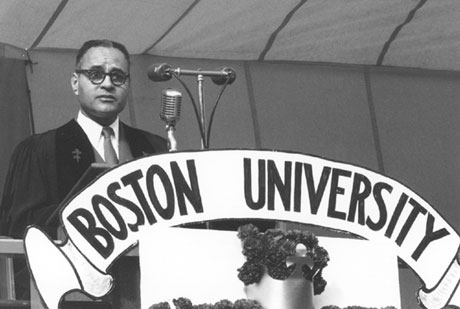 |
|
||
|
|||

Ralph Bunche (Hon.'54), who was awarded the Nobel Peace Prize in 1950, speaks at the University's 1954 Commencement. Photo by BU Photo Services
Ralph Bunche Centennial Celebration
The GRS African-American Studies Program and the International History Institute present a daylong conference on the life and work of Ralph Bunche (Hon.'54) on Friday, March 19, in the SMG Executive Leadership Center. The conference, entitled Ralph Bunche and the American Experience, is part of a number of events planned worldwide to celebrate the 100th anniversary of Bunche's birth.
The morning panel, which begins at 9 a.m., focuses on The American Dilemma: Ralph Bunche as Activist. Bunche (19041971) received his undergraduate degree from the University of California at Los Angeles and his master's and doctorate from Harvard University. He was active in the civil rights movement all his life. He criticized both America's social system and established black organizations as an undergraduate, but is generally considered to have been a moderate. He wrote A World View of Race in 1936 and was a member of the Black Cabinet, which was consulted on minority problems by FDR's administration. He declined to be President Truman's assistant secretary of state because of segregated housing in Washington, D.C., helped lead the 1965 civil rights march in Montgomery, Ala., organized by Martin Luther King, Jr. (GRS'55, Hon.'59), and supported the programs of the NAACP and the Urban League.
Bunche is better known, however, for his service to the U.S. government and his work on behalf of the United Nations. This provides the basis of the afternoon panel, which begins at 1 p.m. and is entitled The International Dilemma: Ralph Bunche as Diplomat. In 1946, U.N. Secretary-General Trygve Lie put Bunche in charge of the U.N. Department of Trusteeship to handle the problems presented by countries that had not yet attained self-government. Later he was appointed assistant to the U.N. Special Committee on Palestine, then as principal secretary to the U.N. Palestine Commission, whose responsibility was to carry out the General Assembly's 1947 partition of the British Mandate into Jewish and Arab states. When Israel was granted independence in May 1948, the surrounding Arab states attacked. Swedish diplomat Count Folke Bernadotte was appointed mediator, with Bunche his chief aide. Bernadotte was assassinated, and Bunche spent nearly 11 months negotiating nonstop the armistice agreements between Israel and the Arab States.
He was awarded the Nobel Peace Prize in 1950 for this effort. In his acceptance speech, he said, I am not unaware, of course, of the special and broad significance of this award far transcending its importance or significance to me as an individual in an imperfect and restive world in which inequalities among peoples, racial and religious bigotries, prejudices, and taboos are endemic and stubbornly persistent. From this northern land [Norway] has come a vibrant note of hope and inspiration for vast millions of people whose bitter experience has impressed upon them that color and inequality are inexorably concomitant.
This event is free and open to the public. For more information, call 617-353-2795.
![]()
12 March 2004
Boston University
Office of University Relations